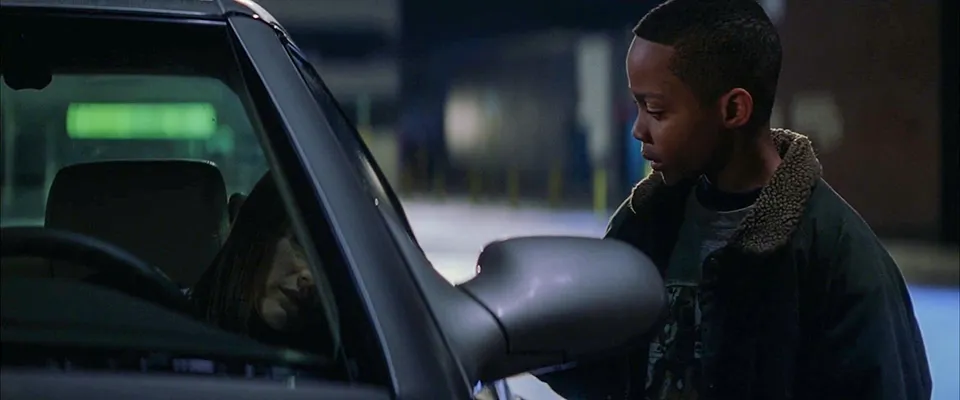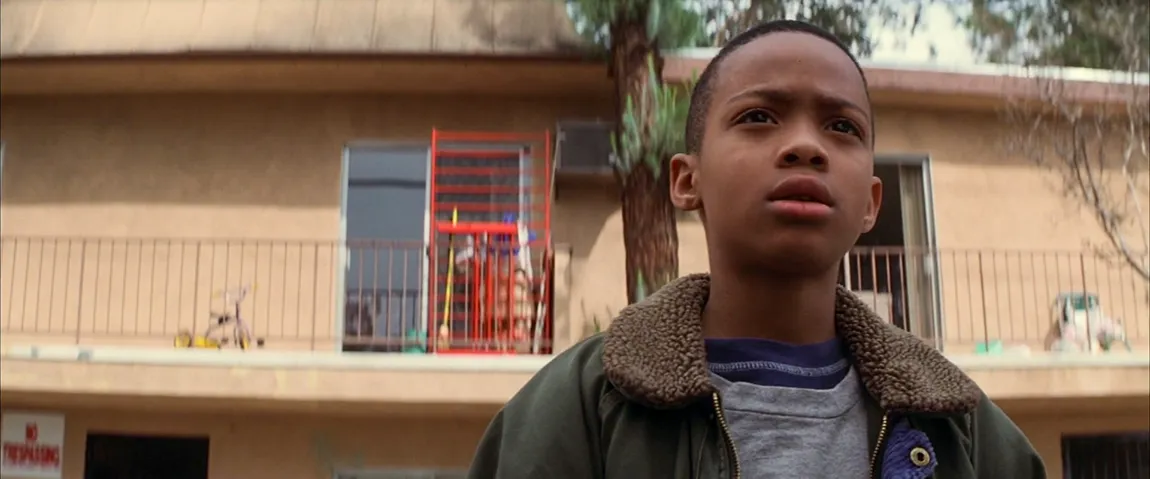Dixon as an Agent of the Divine
Because Dixon’s storyline was hacked to nearly nothing, his role in Magnolia shifts from secondary to … well, it’s a little odd.
Newest Essays
“but it did happen”: The Importance of Four Words in the Corner
Kiss, Interrupted: “Say it, Jimmy”/“Just let me go, Jim”
The Unseen Ending: The Death of Jimmy Gator
An Active God, Acts of God: Dixon as an Agent of the Divine
The Kid in the Hall: An Introduction on a Prologue
Prisoner and Preacher: Earl Partridge
Why Are There Frogs Falling from the Sky?
But there are bits in his rap encounter with Jim that suggest an alternative way to consider Dixon: as the hand (and voice) of God.
Dixon gives Jim a gift: He tells him, in a hip-hop fashion, that Worm is the person he’s looking for.
“You wanna know who killed that guy?” he asks before his performance. “I can help you solve the case. I can tell you who did it.”
But at all points, Jim treats him as an annoyance.
Dixon persists: “Busta, you better just shut the fuck up. Try to listen and learn.”
“Whoa. Cut it, Coolio,” Jim says. “I’ve had enough of the mouth and the language.”
Finally, Dixon unleashes a potent mix of information, hints, and foreshadowing: “Check that ego. Come off it, I’m the prophet, the professor. I’ma teach you about the Worm, who eventually turned to catch wreck with the neck of a long-time oppressor. And he’s runnin’ from the devil, but the debt is always gainin’, and if he’s worth being hurt, he’s worth bringing pain in. When the sunshine don’t work, the good Lord bring the rain in. Now that shit will help you solve the case.”
From the screenplay, we can understand that Dixon is pointing a finger at his father, Worm. We can also tie “long-time oppressor” to the dead guy in the closet, who Marcie says (in the screenplay) abused her son (Worm) and grandson (Dixon).
Those details are less important than understanding that Dixon, even in his truncated subplot, can be seen to serve a genuine function in Magnolia — even if it might seem a bit of a stretch.
Dixon calls himself “the prophet,” a phrase whose religious implications are obvious. His sunshine/rain line is a clever bit of frog foreshadowing that also articulates Magnolia’s consistent strategy of crisis as an agent of change. “Long-time oppressors,” “runnin’ from the devil,” and “the debt is always gainin’” all apply broadly to most of the film’s main characters.
At this stage of the movie, Dixon is clearly handing sunshine to Jim: a name to crack the case, and some important lessons about life. The final push is a threat: If you don’t do something with this gift, the good Lord has other tools at his disposal.
But the cop can’t get past his prejudices; he won’t shut the fuck up and try to listen and learn.
“Okay,” he says. “Whatever that meant. I’m sure it’s real helpful, Ice-T.”
“Did you listen to me?”
“I was listening to you.”
“I told you who did it, and you’re not even listening to me.”
Let’s take the word “prophet” literally — that Dixon, like Moses before him, is God speaking through a person. If we also take the frogs as an act of God, crucial bits of the movie are re-framed.
In this formulation, where does God intervene in Magnolia? He takes Jim’s gun through Dixon, and — when Jim has realized some of his potential — he returns it.
He spares Linda’s life through Dixon. The kid walks up to Linda’s car with seeming purpose, and he knocks on the window as if he already knows what’s inside. His “What’s wrong with you?” is more rebuke than question.

By sending a frog through the skylight, he prevents Jimmy from shooting himself.
“I’m not done with you yet,” God seemingly says to Jimmy and Linda.
In using frogs to make Donnie fall from the ladder and smash his teeth, he forces the Quiz Kid to understand that he was doing the wrong things for the wrong reasons. In making Donnie the most pitiable figure possible, he pushes Jim to assist instead of arrest.
The frogs awaken in Stanley a sense of greater possibilities — “This happens. This is something that happens” — that allows him to make a simple demand of his father.
I freely admit that elevating Dixon to this divine function will strike many people as ridiculous, rationalizing a basic flaw in Magnolia: that Anderson’s trimming left Marcie and Dixon hanging because they could not be cleanly excised. And it’s true that Dixon steals from both Jim and Linda — behavior that’s not particularly godly.
Yet there’s textual evidence for this reading, and it neatly resolves both the Dixon problem and the flourish of Jim’s gun falling from the sky.
Ultimately, Magnolia crafts a world where the favorite Bible verse is not John 3:16 but Exodus 8:2, a threat from God conveyed by Moses and fulfilled in modern California. Is it really so strange that a little black boy could also be a genuine prophet?

